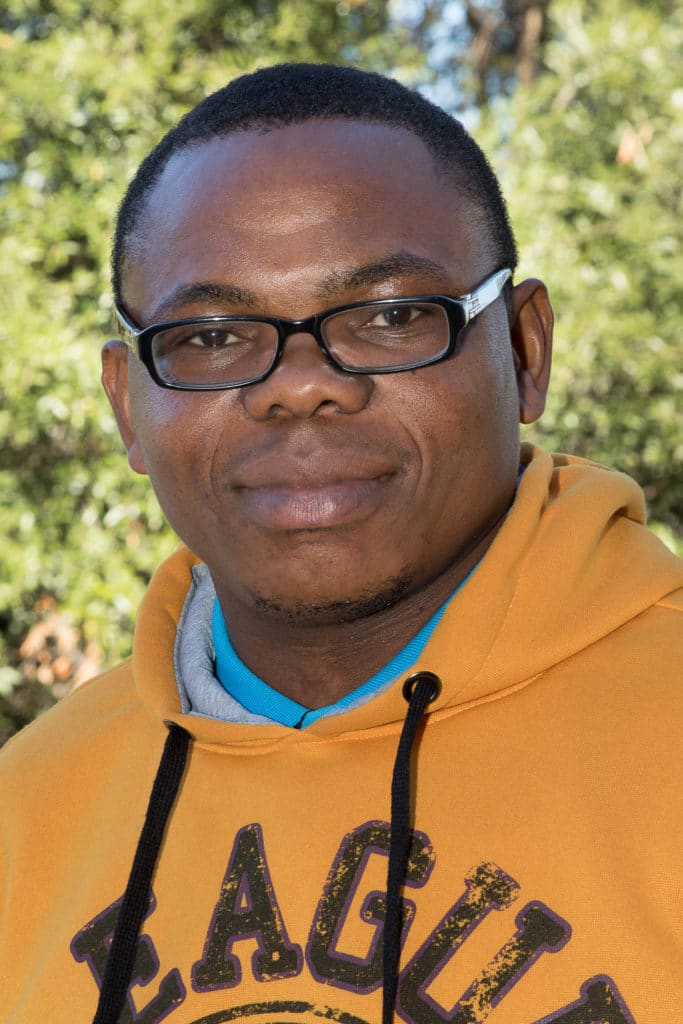“The project will seek to enquire into the reproductive, sexual and maternal healthcare needs and challenges of women with disabilities in Ghana; challenge assumptions about disability and asexuality; and, ask how the issue of disability in contexts such as Ghana could be better theorised and studied,” said John Ganle, STIAS Iso Lomso Fellow from the Department of Population, Family and Reproductive Health, School of Public Health, University of Ghana, who was presenting the background to his current project to STIAS fellows.

“Persons with disabilities are estimated to constitute 15% of the world’s population. They remain, however, one of the most marginalised and socially excluded groups.”
Ganle explained that his interest in this area started with a chance encounter with a pregnant, disabled woman, Habiba, at Buipe Polyclinic in 2012. Habiba was ‘stranded’ outside the clinic because she needed help to access the building. And, although Ganle had had many encounters with disabled persons in his life, he quickly realised: “I didn’t have the courage to ask questions about their lives let alone ask about their sexual, reproductive and maternal health experiences.”
“Disability remains hidden in Africa – families often don’t allow people to know,” he continued. “There is a need to make it more visible.”
“Where people are fighting for basic survival, sexuality is seen as secondary. In this situation sexual and reproductive needs are overlooked.”
In Ghana an estimated 7 to 12% of the population is disabled but over 60% of these are women. Persons with disabilities generally have poorer health, lower education achievements, fewer economic opportunities and higher rates of poverty than people without disabilities.
“Women with disability are even more likely to be poorer and have lower social and economic status than their counterparts,” said Ganle. “Women may also suffer more due to the patriarchal nature of many societies.”
There is also evidence of physical, sexual and emotional abuse with the disabled being seen as ‘easy targets’.
People with disabilities have largely been ignored in reproductive health programming and policy making in many African countries. Ghana has had a Persons with Disabilities Act since 2006 but it says nothing about sexual and reproductive issues or their inclusion in health programmes.
“There is a generalised expectation of asexuality, and there seems to be an ableist fetishism about disability, which mocks the person with disability in sexual relationships,” argued Ganle.
This has resulted in poor theorisation of disability and reproduction, and a missed opportunity to understand the sexual, reproductive and maternal healthcare needs, healthcare-seeking behaviours, and challenges of women with disability in many African settings.
“Disability may hinder full, equal participation in society,” he said. “Groups that lack power often lack the ability to define and regulate their own sexuality. Denial of sexual identity may be a feature of the power relations.”
“We know that people with disabilities are sexual beings with the same aspirations for sexual pleasure, intimacy, love, friendship and relationships as anyone else,” continued Ganle. “There is a push to make these issues more visible but progress is slow.”
“To some extent disability and parenthood are conceived as contradictory. There is a lack of state support for raising children. There is probably still the underlying notion that we need to avoid reproducing more disabled people.”
Impediments to health-service delivery include staff attitudes, physical barriers, poor information dissemination and awareness, lack of preparation of the health system and communication barriers.
“Habiba recalled being referred to as ‘a pregnant cripple’ by clinic nurses.”
“Even recognition of the situation by leaders doesn’t seem to drive policy change,” Ganle added. “Training healthcare workers in this area just doesn’t happen.”
A new model
Ganle pointed out that there have been three broad approaches to how disability has been theorised – the functional/medical model which sees disability as an individual not societal problem; the social model which is driven by civil rights and social justice, and is usually highly politicised; and, the World Health Organization ICF (International Classification of Functioning, Disability and Health) model which attempts to find a midway between the two.
“I would argue for the development of new and/or modified theoretical and methodological approaches that allow for greater visibility of persons with disabilities and their reproductive, sexual and maternal healthcare needs and challenges.”
‘‘I’m hoping that this research might propose a new model; a model that conceptualises sexuality and reproduction as part of the many expressions of human choice. I am looking at the possibilities of constructing a disability theory using this to make connections with non-disabled people, rather than presenting disabled and non-disabled people as in continuous and unchanging opposition,’’ he said.
Ganle pointed to three major challenges in the work – the evidence gap, the theoretical gap and the methodological challenges.
“There is a lack of evidence on what the needs are, what the challenges are, and how to respond to the needs and challenges.” he said.
“The biggest methodological challenge is how to make research subjects visible. We must hear their voices. Research outcomes must benefit research communities otherwise research can be further oppressing.”
“We have to get past excessive gatekeeping and stigma,” he added. “Subjects should not just be sources of data but also dialogue partners.”
“The language people use to talk about themselves is very important.”
“The concept of personhood in the African context needs to be understood, as well as the geopolitical context,” he continued. “There has not been much theorising from the African continent. I’m hoping to add a grassroots angle.”
“There is also definitely room to think about how people in the midst of personal ‘suffering’ choose to do things differently.”
“I would like to reframe sexuality in disability away from the negative,” he concluded.
